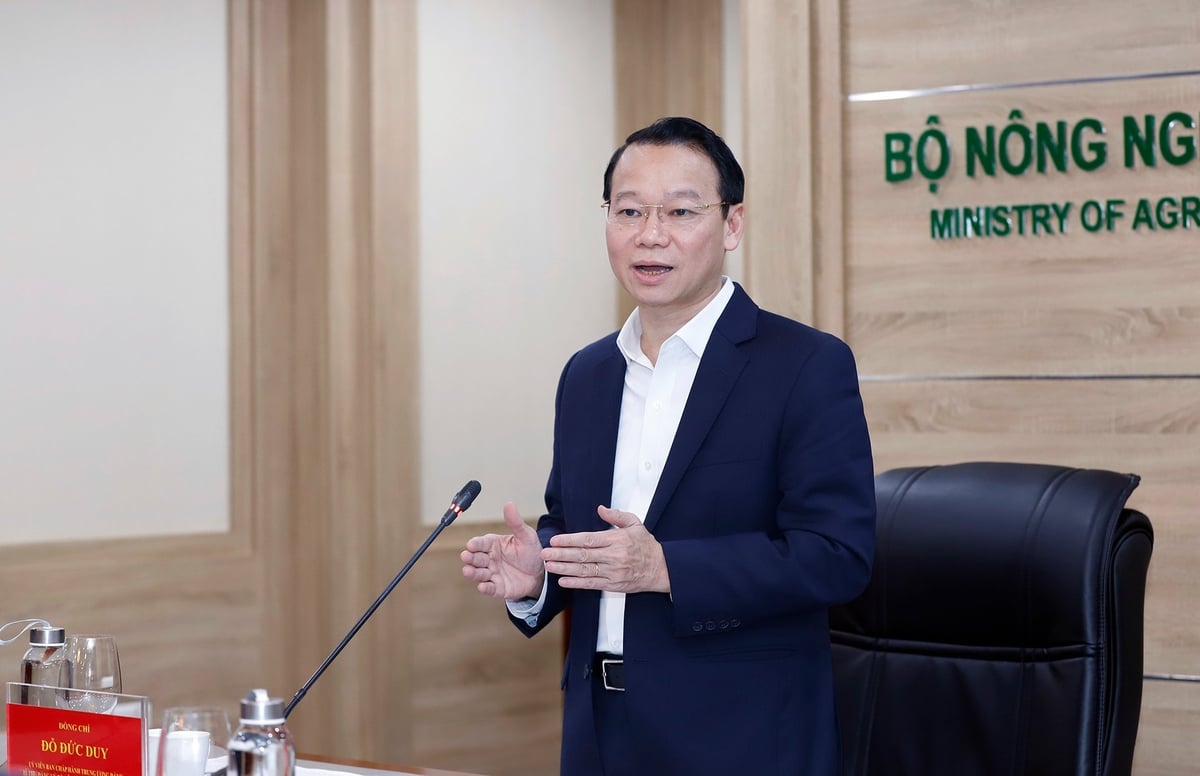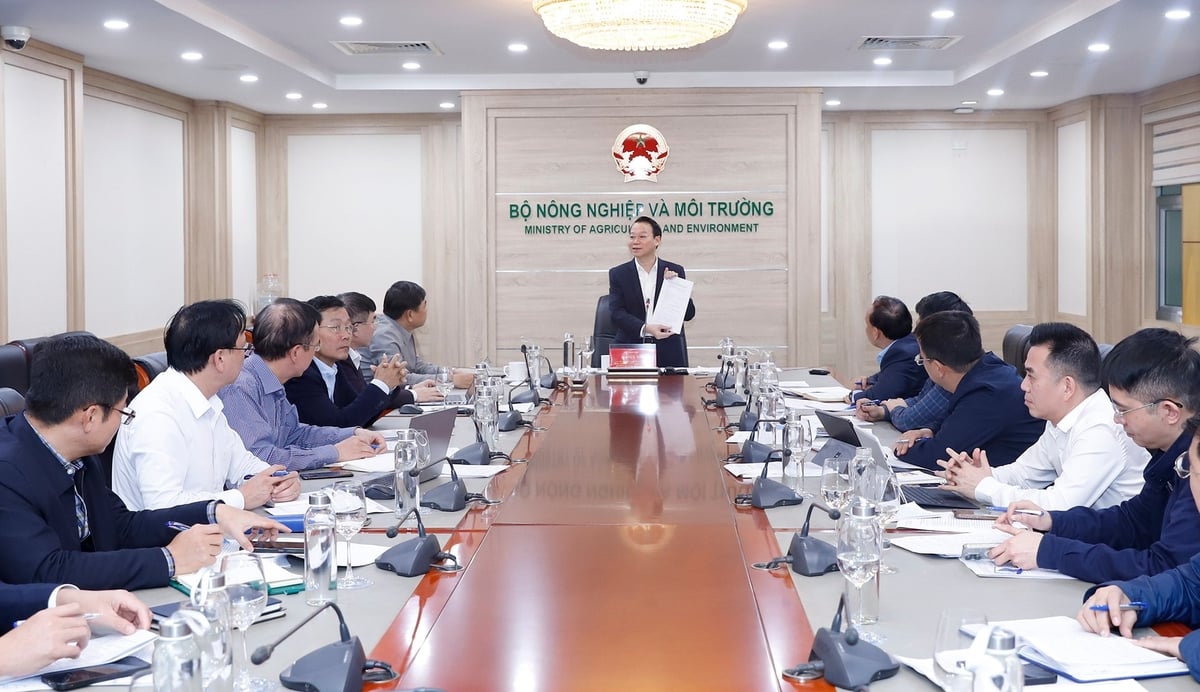June 15, 2025 | 19:42 GMT +7
June 15, 2025 | 19:42 GMT +7
Hotline: 0913.378.918
June 15, 2025 | 19:42 GMT +7
Hotline: 0913.378.918
On the evening of March 17, in the spirit of 'speaking and taking action,' the Ministry of Agriculture and Environment held a meeting to accelerate the completion of the Plan for Prevention and Control of Land Subsidence, Erosion, Flooding, Drought, and Saltwater Intrusion in the Mekong Delta.
Minister Do Duc Duy provided key directives to address the increasingly severe challenges that natural disasters pose to this fertile region.
Minister Do Duc Duy emphasized that specialized agencies should approach and develop the Plan from an 'economic and technical' perspective rather than purely technical proposals. This approach will help address economic, security, and environmental issues through technical tools combined with multi-purpose solutions.

Minister Do Duc Duy chaired the meeting to finalize the Plan for Prevention and Control of Land Subsidence, Erosion, Flooding, Drought, and Saltwater Intrusion in the Mekong Delta. Photo: Khuong Trung.
Minister Do Duc Duy pointed out that in the past, the Mekong Delta primarily faced natural disasters such as flooding, with prevention measures mainly focusing on building residential clusters, embankments, and land elevation. However, there have been increasingly complex impacts of climate change, the nature of natural disasters has changed significantly. Phenomena such as land subsidence, drought, and saltwater intrusion are on the rise, causing widespread impacts and severely affecting people's livelihoods and the socio-economic development of the region.
According to the Minister, these issues not only disrupt production, particularly in agriculture and fisheries, but also threaten national security, water security, and the safety of local communities. The old solutions are no longer suitable for the new situation, and the Mekong Delta faces an uncertain future if appropriate and timely disaster prevention measures are not implemented.
According to the report, the main causes of the increasing natural disasters in the Mekong Delta are global climate change, internal development within the region, and unsustainable exploitation of natural resources, particularly excessive groundwater extraction and reduced upstream water flow. Land subsidence, water shortages, and saltwater intrusion are gradually becoming major challenges that threaten the environment and the livelihoods of local communities.
"The impacts of natural disasters are not limited to declines in agricultural and aquacultural production but also have far-reaching effects on natural ecosystems, particularly mangrove forests, which are a vital habitat for many aquatic species. These issues require immediate and coordinated intervention to protect not only people but also the ecological environment in the region," Minister Do Duc Duy emphasized.
The leader of the agriculture and environment sector emphasized that disaster prevention solutions cannot rely solely on isolated measures but must be part of a comprehensive, long-term strategy that integrates both prevention and adaptation. The Minister also agreed with Deputy Minister Nguyen Hoang Hiep's view that the plan must be aligned with regional planning, existing development programs and projects in the Mekong Delta, as well as the projects and plans outlined in Resolution 120 previously issued.

Deputy Minister Nguyen Hoang Hiep spoke at the meeting. Photo: Khuong Trung.
One of Minister Do Duc Duy’s strong directives is the need to develop both structural and non-structural solutions, including raising public awareness and applying science and technology to disaster prevention.
'We need solutions not only for prevention but also for adapting to the unavoidable impacts of climate change. Our focus will be on inter-regional solutions because natural disasters know no borders and affect all areas within the region,' the Minister emphasized.
Under these conditions, the economic-technical plan will be developed to address economic, security, and environmental issues through modern technical tools combined with multi-purpose solutions. Notably, the Minister emphasized that the plan should focus on investing in a comprehensive database system for flooding, saltwater intrusion, and disaster warnings while upgrading the monitoring system to promptly detect and respond to abnormal natural disasters.
Another key factor highlighted by the Minister is the mobilization of resources from the state budget, non-governmental organizations, and the community. Since disaster prevention projects require significant funding, the effective allocation of resources will be crucial in determining the success of the proposed solutions.
In addition, the Minister also requested relevant agencies to assess the impact of the proposed solutions on the region's socio-economic development and security, thereby making necessary adjustments to maximize the protection of people's lives and property.
Recognizing the plan as not only an urgent strategy but also a key factor in ensuring the sustainable development, security, and long-term economic growth of the Mekong Delta amid globalization and climate change, Minister Do Duc Duy directed specialized units to finalize it promptly and report to the Ministry’s leadership. From there, the Ministry of Agriculture and Environment will submit the plan to Party and Government leaders for approval.

Overview of the meeting on the evening of March 17. Photo: Khuong Trung.
Minister Do Duc Duy affirmed that the synchronized implementation of comprehensive solutions, combining prevention and adaptation, is the key to building a safe and sustainable Mekong Delta.
Implementing the directive of Deputy Prime Minister Tran Hong Ha at the working session on March 12, 2025, the Department of Dyke Management and Disaster Prevention has reviewed and consolidated relevant content to update and finalize the Plan for Prevention and Control of Land Subsidence, Erosion, Flooding, Drought, and Saltwater Intrusion in the Mekong Delta region until 2035, with a vision toward 2050.
Accordingly, the Department of Dyke Management and Disaster Prevention has coordinated with relevant agencies of the Ministry of Construction to compile data on residential relocation under the Program for Developing Residential Clusters and Flood-Resistant Housing in the Mekong Delta. It has also proposed the construction of integrated, multi-purpose projects; identified key projects in order of priority; amended and supplemented relevant legal regulations to facilitate the development of mechanisms and policies for mobilizing non-budget resources; and formulated policies to support farmers in transitioning crop and livestock structures to ensure a rapid and sustainable transformation.
Translated by Kieu Chi

(VAN) The working delegation from the Ministry of Agriculture and Environment conducted an important trip to the Netherlands to strengthen strategic partnerships and sustainable development in the agricultural sector.

(VAN) The letter ‘A Plea from the Ocean’ not only evokes emotion but also awakens the human conscience to the responsibility of protecting life on Earth.

(VAN) The Department of Agriculture in South Africa has announced the country’s first mass vaccination of poultry to prevent local birds from contracting avian influenza.

(VAN) Establishment of the Mekong Delta Regional Agricultural Linkage Center, aiming for a closed value chain, deep processing, trading platforms, and international market connectivity.

(VAN) Gia Lai province has recently recorded 460 rare species of animals and plants, contributing to forest conservation and biodiversity planning in the region.

(VAN) Ms. Caroline Beresford, New Zealand Ambassador to Vietnam, expressed confidence that agricultural cooperation between Vietnam and New Zealand will develop sustainably, be climate-resilient, and promote gender equality.

(VAN) Vietnam reaffirms its commitment to international cooperation in fostering sustainable and responsible fisheries while ensuring resilient livelihoods for small-scale fishing communities.